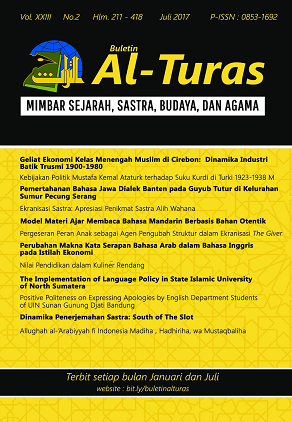Positive Politeness on Strategies of Expressing Apologies by English Department Students of UIN Sunan Gunung Djati Bandung
DOI:
https://doi.org/10.15408/bat.v23i2.5786Keywords:
pragmatics, politeness, speech acts, strategies of expressing apologiesAbstract
This paper tries to describe the strategies of English department students in expressing apologies and their positive politeness strategy while expressing apologies. The data sources are students of UIN Sunan Gunung Djati Bandung, the data are taken by using DCT (Discourse Completion Test). Students of UIN Sunan Gunung Djati use various strategies in expressing apologies when they express apologies to the lecturer for coming late to class; they tend to use IFID followed by the explanation and IFID followed by request. Moreover, when students express an apology to their friends, they use IFID + Promise and IFID+ Explanation. The strategies of expressing apologies to the parent show that the highest number of strategies in expressing apologies by students is IFID+ Explanation and IFID+ Responsibility + Explanation. Positive politeness strategy is performed by students by using the honorific “sir”. On the other hand, positive politeness strategy of expressing apology to a friend, the students use more intimacy words such as “bro, mate, friend”. Students who express an apology to parents tend to use intimacy words such as “Mom, Dad, and Mommy”.
Keywords: pragmatics, politeness, speech acts, strategies of expressing apologies.
Abstrak
Penelitian ini mencoba mendeskripsikan strategi mahasiswa jurusan Bahasa Inggris dalam mengungkapkan permintaan maaf dan strategi kesantunan positif yang digunakan ketika melakukan tindak tutur meminta maaf. Sumber data siswa UIN Sunan Gunung Djati Bandung, datanya diambil dengan menggunakan DCT (Discourse Completion Test). Mahasiswa UIN Sunan Gunung Djati menggunakan berbagai strategi dalam mengungkapkan permintaan maaf. Ketika mereka mengungkapkan permintaan maaf kepada dosen karena datang terlambat mereka dominan menggunakan strategi IFID diikuti dengan penjelasan, dan IFID diikuti oleh permintaan. Ketika mahasiswa menyampaikan permintaan maaf kepada teman, mereka menggunakan IFID + Janji dan IFID + Penjelasan,. Ketika mahasiswa mengungkapkan permintaan maaf mereka lebih banyak menggunakan strategi IFID + penjelasan dan IFID+ tanggungjawab+ penjelasan. Strategi kesantunan positif dilakukan oleh mahasiswa dengan menggunakan kata "sir”. Di sisi lain, strategi kesantunan positif untuk mengekspresikan permintaan maaf kepada teman, para mahasiswa menggunakan kata-kata yang lebih intim seperti "bro, mate, friend", sedangkan ketika dengan orang tua mereka menggunakan “Mom, Dad dan Mommy”
Kata kunci: pragmatik, kesantunan, tindak tutur, strategi permintaan maaf
DOI : 10.15408/bat.v23i2.5786
References
References
Austin, John L. How to Do Things with Words. (Great Britain: Oxford University Press, 1962)
Al-Sobh, Mahmoud Ali. An Analysis of Apology as a Politeness Strategy Expressed by Jordanian University Students. International Journal of Humanities and Social Science Vol. 3 No. 2 [Special Issue – January 2013] 150
Brown, Penelope and Stephen C Levinson. Politeness Some Universals In Language Use. (Great Britain: Cambridge University Press, 1992)
Chamani, Fariba. 2014. Gender Differences in the Use of Apology Speech Act in Persian. International Journal of Linguistics ISSN 1948-5425 2014, Vol. 6, No. 6
Cohen, Andrew D , Elite Olshtain and David S Rosenstein. 1986. Advanced EFL apologies: what remained to be learned? . International Journal Social and Language 62 (1986), pp 51-74
Davies, Bethan l. , Andrew John Merrison,and Angela Goddard. (2007). Institutional Apologies in UK Higher Education: Getting Back into the Black before Going into the Red. Journal of Politeness Research 3 (2007), 39_63
Engel, Beverly. The Power of Apology: Healing step to transform all your relationships. (USA: John Willey & Son,inc , 2001)
Grundy, Peter. Doing Pragmatic.(London, Arnold, 2000) page 162
Leech, Geoffrey. (1990). Principles of Pragmatics. New York: Longman Group Limited
Levinson, Stephen C. (1995). Pragmatics. New York: Cambridge University Press
Majeed, Ammir and Fauzia Janjua. 2014. Apology Strategies and Gender: A Pragmatic Study of Apology Speech Acts in Urdu Language. Merit Research Journal of Education and Review (ISSN: 2350-2282) Vol. 2(3) pp. 054-061, March, 2014
Murad, Tareq Mitaib.2012. Apology Strategies in the Target Language (English) of Israeli-Arab EFL College Students Towards Their Lecturers of English Who Are Also Native Speakers of Arabic. Jurnal Studies in Literature and Language Vol. 4, No. 3, 2012, pp. 23-29
Ogiermann, Eva. On the Culture Specificity of Linguistic Gender Difference: the Case of English and Russian Apologies. Intercultural Pragmatics 5-3 (2008): 259-286.
Ogiermann, Eva. On Apologising in Negative and Positive Politeness Cultures.
(Amsterdam: John Benjamin Publishing Co., 2009)
Searle, John. Expression and Meaning: Studies in the Theory of Speech Acts. (New York Cambridge University Press, 1999)
Smith, Nick. (2008). I Was Wrong: The Meaning Of Apology. United Kingdom: Cambridge University Press
Thomas, Jenny. Meaning in Interaction: an Introduction to Pragmatics. ( Longman Group Limited, 1995)
Wouk, Fay. (2006).Strategies of Apologizing in Lombok Indonesia. Journal of Politeness Research 2 (2006), 277-311.
Yule, George.Pragmatics. (Hongkong: Oxford University Press, 1996.)







